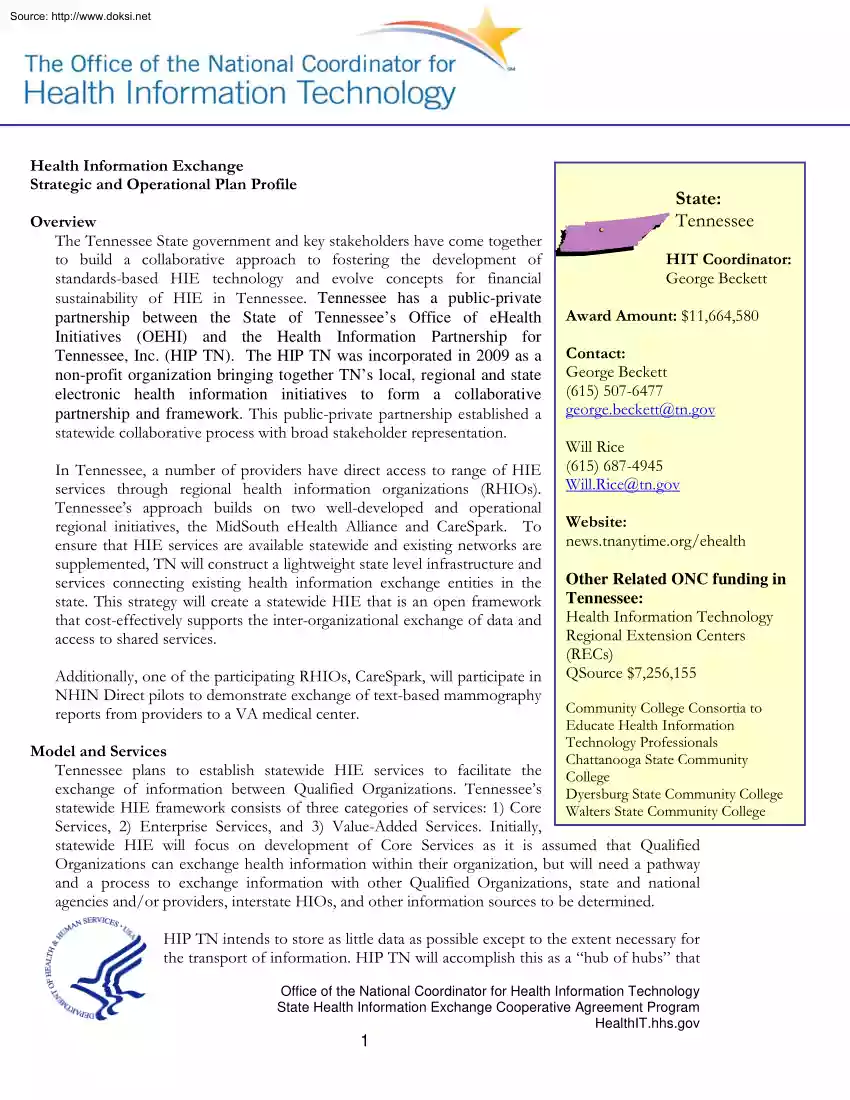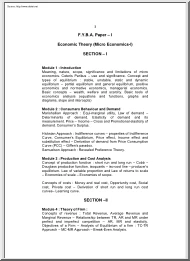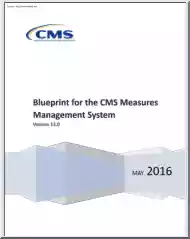Értékelések
Nincs még értékelés. Legyél Te az első!
Mit olvastak a többiek, ha ezzel végeztek?
Tartalmi kivonat
Source: http://www.doksinet Health Information Exchange Strategic and Operational Plan Profile Overview The Tennessee State government and key stakeholders have come together to build a collaborative approach to fostering the development of standards-based HIE technology and evolve concepts for financial sustainability of HIE in Tennessee. Tennessee has a public-private partnership between the State of Tennessee’s Office of eHealth Initiatives (OEHI) and the Health Information Partnership for Tennessee, Inc. (HIP TN) The HIP TN was incorporated in 2009 as a non-profit organization bringing together TN’s local, regional and state electronic health information initiatives to form a collaborative partnership and framework. This public-private partnership established a statewide collaborative process with broad stakeholder representation. In Tennessee, a number of providers have direct access to range of HIE services through regional health information organizations (RHIOs).
Tennessee’s approach builds on two well-developed and operational regional initiatives, the MidSouth eHealth Alliance and CareSpark. To ensure that HIE services are available statewide and existing networks are supplemented, TN will construct a lightweight state level infrastructure and services connecting existing health information exchange entities in the state. This strategy will create a statewide HIE that is an open framework that cost-effectively supports the inter-organizational exchange of data and access to shared services. Additionally, one of the participating RHIOs, CareSpark, will participate in NHIN Direct pilots to demonstrate exchange of text-based mammography reports from providers to a VA medical center. State: Tennessee HIT Coordinator: George Beckett Award Amount: $11,664,580 Contact: George Beckett (615) 507-6477 george.beckett@tngov Will Rice (615) 687-4945 Will.Rice@tngov Website: news.tnanytimeorg/ehealth Other Related ONC funding in Tennessee: Health
Information Technology Regional Extension Centers (RECs) QSource $7,256,155 Community College Consortia to Educate Health Information Technology Professionals Chattanooga State Community College Dyersburg State Community College Walters State Community College Model and Services Tennessee plans to establish statewide HIE services to facilitate the exchange of information between Qualified Organizations. Tennessee’s statewide HIE framework consists of three categories of services: 1) Core Services, 2) Enterprise Services, and 3) Value-Added Services. Initially, statewide HIE will focus on development of Core Services as it is assumed that Qualified Organizations can exchange health information within their organization, but will need a pathway and a process to exchange information with other Qualified Organizations, state and national agencies and/or providers, interstate HIOs, and other information sources to be determined. HIP TN intends to store as little data as possible except
to the extent necessary for the transport of information. HIP TN will accomplish this as a “hub of hubs” that Office of the National Coordinator for Health Information Technology State Health Information Exchange Cooperative Agreement Program HealthIT.hhsgov 1 Source: http://www.doksinet provides service to support connectivity and data transport. Tennessee will continue its commitment to using and helping local providers migrate to federally-recognized HIT standards through its statewide HIE collaborative process. TN will have additional HIE core services available to providers in 2011, which include Master Provider and Master Facilities Indexes. Entities participating in statewide HIE could leverage these indexes to route prescriptions, labs and summary care records to the appropriate destinations. Office of the National Coordinator for Health Information Technology State Health Information Exchange Cooperative Agreement Program HealthIT.hhsgov 2 Source:
http://www.doksinet Highlights • • • • Implementation: Tennessee will have additional HIE services available to providers in 2011. In June, HIP TN released an RFP to select a vendor to provide Core Services and to provide access to the state-identified Enterprise Services and additional Value-Added Services. The implementation of Core Services is scheduled to begin right after the contract is signed with the vendor. In the released RFP for Core Services, Tennessee included a request for Master Provider and Master Facilities Indexes. Entities participating in statewide HIE could leverage these indexes to route labs and summary care records to the appropriate destinations. Public Health Reporting: Each of the Department of Health’s 13 regional health clinics and six metro health clinics, connect to the Immunization Registry through the State’s public health practice management system. Providers capable of sending and receiving HL7 messages can also connect to the
Immunization Registry through an Electronic Data Interchange (EDI). Users not capable of sending and receiving HL7 messages can update and query for information through a web-based portal, Tennessee Web Immunization System (TWIS). Currently, surveillance data collected at the local/regional level are not shared with TDOH. Bidirectional communication between TDOH and healthcare providers, including alerting, could be accomplished through HIOs in Tennessee. Notifiable lab results - The Bureau of Health Services Administration, Communicable Environmental Disease Services Division, performs data collection of reportable and notifiable diseases. One method by which TDOH receives reports is through electronic laboratory results reporting (“ELR”) which is currently being done by Mayo and LabCorp laboratories. Reportable diseases are electronically captured by TDOH, which notifies CDC using CDC-specified standards (e.g HL7) Coordination with Medicaid: Tennessee’s statewide HIE efforts
are closely coordinated and integrated with health IT adoption initiatives, in particular, planning and implementation for TennCare’s incentive program for the meaningful use of certified EHR technologies. The State views the numerous interdependencies as opportunities for leveraging state activities to maximize impact and minimize duplication in efforts. TennCare staff are active participants in the HIE statewide collaborative process, serving on the HIP TN Board, Operations Council, and several workgroups. In addition, Tennessee’s statewide HIE capacities are intended to be developed to ensure that they support the evolving requirements for meaningful use, enabling TennCare providers to successfully access available incentives. Reciprocally, TennCare’s planning and implementation of the EHR incentive program and development of the State Medicaid Health IT Plan are being conducted jointly with OeHI and in coordination with other statewide HIE partners. Coordination with other
Federal Agencies: Tennessee’s eHealth efforts have been and will continue to be closely coordinated with federal programs that deliver and support healthcare delivery in Tennessee. In December 2008, the Quillen VA Medical Center partnered with CareSpark for a national demonstration of exchange of patient data between the VA, the Department of Defense, CareSpark, Kaiser Permanente, MedVirginia, and the North Carolina Healthcare Information and Communications Alliance, as part of the Wounded Warrior use case for the Nationwide Health Information Network (“NHIN”). CareSpark is also leveraging its NHIN efforts to exchange data with the Social Security Administration. In 2010, the Social Security Administration awarded $1.36 million contract to CareSpark to develop, test and Office of the National Coordinator for Health Information Technology State Health Information Exchange Cooperative Agreement Program HealthIT.hhsgov 3 Source: http://www.doksinet • implement a capability to
gather and relay medical records as authorized by patients applying for disability benefits. Initial testing will be conducted in collaboration with University of Tennessee Medical Center in Knoxville, as well as Holston Medical Group and State of Franklin Healthcare Associates in the Tri-Cities region. CareSpark will utilize its NHIN gateway and its standards-based HIE infrastructure to reduce time for determination of eligibility for disability benefits, thereby expediting the delivery of services to qualified applicants and payment for services rendered by their healthcare providers. NHIN: Tennessee is a member of the NHIN Direct Workgroup, specifically the Implementation and Geographies Workgroup. Members of this group are looking for pilots to implement the Direct code. Tennessee plans to pilot with a local VA hospital and use CareSpark (the RHIO) for secure messaging. CareSpark is very involved with NHIN Direct activities. This project will demonstrate the exchange of text-based
mammography reports from a private-sector provider to a VA medical center. The provider will be a Tennessee provider participating in the CareSpark health information exchange network. The project will demonstrate an exchange between two different health information service providers, one being CareSpark, and one being the VA Office of the National Coordinator for Health Information Technology State Health Information Exchange Cooperative Agreement Program HealthIT.hhsgov 4 Source: http://www.doksinet Meaningful Use Landscape Strategy E-Prescribing Approximately 82% of chain and independent community pharmacies across Tennessee have activated capabilities for accepting electronic prescribing and refill requests. Core Services provided through the HIE will include Master Provider and Master Facilities Indexes. Entities participating in statewide HIE could leverage these indexes to route prescriptions to the appropriate destinations. In addition, the Core Services will include
comprehensive authentication and credentialing services which providers and pharmacies could use to meet the requirement of e-Prescribing of controlled substances. Additionally, OEHI is working with TennCare regarding the feasibility of some type of reimbursement for pharmacies for Medicaid prescriptions. In addition, OEHI and TennCare are evaluating the use of TennCare’s EHR Incentive Program Administrative Funds to augment existing grants or fund new grants to provide incentives to adopt certified EHR technologies that include e-Prescribing capabilities. Structured Lab Results OEHI began the landscape assessment by identifying each laboratory operating in the state using data collected for the Clinical Laboratory Information Act and state data. Using the list of unique organizations based on license numbers, OEHI will conduct a survey of laboratories to assess the current availability and plans to produce and deliver standard lab results electronically and the data content and
transmission standards deployed. Tennessee has two well-developed and operational regional initiatives, MidSouth eHealth Alliance and CareSpark. CareSpark’s document-based exchange covers 43% of the region’s providers but do not have a system capable of contributing information for unaffiliated organizations to view. Midsouth eHealth Alliance covers much of the Greater Memphis area and has a 4 year history of sharing data across acute care platforms including real-time sharing of medical histories, medications, and diagnostic testing results. Midsouth eEhalth links over 15 ambulatory clinics sites with the region’s 9 major hospitals and emergency departments. Many of the regions in the state are not served by either CareSpark or MidSouth eHealth. Steps are being taken to build HIE capacity in a number of areas. Core Services provided through the HIE will include Master Provider and Master Facilities Indexes. Entities participating in statewide HIE could leverage these indexes to
route labs to the appropriate destinations. For lab results delivery, routing will be a combination of local edge/community clinician and facility index and statewide routing directory services. Patient Care Summary OEHI will create a value-added service that offers a centralized clearing house of transforming clinical summary documents among providers and patient-designated entities. This service would be analogous to the laboratory-routing clearing house, and would enable organizations that my lack standards-compliant EHR systems to also exchange clinical summary data. This service will allow for the clinical summary exchange for care coordination, capability and capacity for the translation of legacy messaging to standardized CCD and/or CCR. Office of the National Coordinator for Health Information Technology State Health Information Exchange Cooperative Agreement Program HealthIT.hhsgov 5 Source: http://www.doksinet HIE Inventory Standards Quality Improvement Nationwide
Health Information Network Exchange Specifications Nationwide Health Information Network CONNECT Care Coordination Quality Reporting Nationwide Health Information Network DIRECT X Plans to exchange with federal agencies or other states via Nationwide Health Information specifications X Lab Strategy Translation services X Syndromic surveillance Immunization data to an immunization registry Patient Engagement EHR interface Policy strategy X Order Compendium Patient Access/PHR Bi-Directional Blue Button Alignment with CLIA Patient Outreach E-Prescribing X Privacy and Security Privacy and Security Framework based on FIPS Individual choice (Opt In/Opt Out/hybrid) Authentication Services Audit Log Medication History Incentive or grants to independents Opt Out Plan for controlled substance X X Set goal for 100% participation X X X Controlled substance strategy Care Summaries Administrative Simplification Electronic eligibility verification Translation services
X Electronic claims transactions Vendor X Behavioral Health Information Exchange Public Health Electronic lab reporting of notifiable conditions X CCD/CCR Repository Directories Planning Core Services Provider Directory Master Patient Index X X Record Locator Services Health Plan Directory Directory of licensed clinical laboratories Information for this profile was obtained from the approved Operational and Strategic Plan submitted to the National Coordinator for Health Information Technology as a condition of the Health Information Exchange Cooperative Agreement. The complete plan can be downloaded at: www.statehieresourcesorg Office of the National Coordinator for Health Information Technology State Health Information Exchange Cooperative Agreement Program HealthIT.hhsgov 6
Tennessee’s approach builds on two well-developed and operational regional initiatives, the MidSouth eHealth Alliance and CareSpark. To ensure that HIE services are available statewide and existing networks are supplemented, TN will construct a lightweight state level infrastructure and services connecting existing health information exchange entities in the state. This strategy will create a statewide HIE that is an open framework that cost-effectively supports the inter-organizational exchange of data and access to shared services. Additionally, one of the participating RHIOs, CareSpark, will participate in NHIN Direct pilots to demonstrate exchange of text-based mammography reports from providers to a VA medical center. State: Tennessee HIT Coordinator: George Beckett Award Amount: $11,664,580 Contact: George Beckett (615) 507-6477 george.beckett@tngov Will Rice (615) 687-4945 Will.Rice@tngov Website: news.tnanytimeorg/ehealth Other Related ONC funding in Tennessee: Health
Information Technology Regional Extension Centers (RECs) QSource $7,256,155 Community College Consortia to Educate Health Information Technology Professionals Chattanooga State Community College Dyersburg State Community College Walters State Community College Model and Services Tennessee plans to establish statewide HIE services to facilitate the exchange of information between Qualified Organizations. Tennessee’s statewide HIE framework consists of three categories of services: 1) Core Services, 2) Enterprise Services, and 3) Value-Added Services. Initially, statewide HIE will focus on development of Core Services as it is assumed that Qualified Organizations can exchange health information within their organization, but will need a pathway and a process to exchange information with other Qualified Organizations, state and national agencies and/or providers, interstate HIOs, and other information sources to be determined. HIP TN intends to store as little data as possible except
to the extent necessary for the transport of information. HIP TN will accomplish this as a “hub of hubs” that Office of the National Coordinator for Health Information Technology State Health Information Exchange Cooperative Agreement Program HealthIT.hhsgov 1 Source: http://www.doksinet provides service to support connectivity and data transport. Tennessee will continue its commitment to using and helping local providers migrate to federally-recognized HIT standards through its statewide HIE collaborative process. TN will have additional HIE core services available to providers in 2011, which include Master Provider and Master Facilities Indexes. Entities participating in statewide HIE could leverage these indexes to route prescriptions, labs and summary care records to the appropriate destinations. Office of the National Coordinator for Health Information Technology State Health Information Exchange Cooperative Agreement Program HealthIT.hhsgov 2 Source:
http://www.doksinet Highlights • • • • Implementation: Tennessee will have additional HIE services available to providers in 2011. In June, HIP TN released an RFP to select a vendor to provide Core Services and to provide access to the state-identified Enterprise Services and additional Value-Added Services. The implementation of Core Services is scheduled to begin right after the contract is signed with the vendor. In the released RFP for Core Services, Tennessee included a request for Master Provider and Master Facilities Indexes. Entities participating in statewide HIE could leverage these indexes to route labs and summary care records to the appropriate destinations. Public Health Reporting: Each of the Department of Health’s 13 regional health clinics and six metro health clinics, connect to the Immunization Registry through the State’s public health practice management system. Providers capable of sending and receiving HL7 messages can also connect to the
Immunization Registry through an Electronic Data Interchange (EDI). Users not capable of sending and receiving HL7 messages can update and query for information through a web-based portal, Tennessee Web Immunization System (TWIS). Currently, surveillance data collected at the local/regional level are not shared with TDOH. Bidirectional communication between TDOH and healthcare providers, including alerting, could be accomplished through HIOs in Tennessee. Notifiable lab results - The Bureau of Health Services Administration, Communicable Environmental Disease Services Division, performs data collection of reportable and notifiable diseases. One method by which TDOH receives reports is through electronic laboratory results reporting (“ELR”) which is currently being done by Mayo and LabCorp laboratories. Reportable diseases are electronically captured by TDOH, which notifies CDC using CDC-specified standards (e.g HL7) Coordination with Medicaid: Tennessee’s statewide HIE efforts
are closely coordinated and integrated with health IT adoption initiatives, in particular, planning and implementation for TennCare’s incentive program for the meaningful use of certified EHR technologies. The State views the numerous interdependencies as opportunities for leveraging state activities to maximize impact and minimize duplication in efforts. TennCare staff are active participants in the HIE statewide collaborative process, serving on the HIP TN Board, Operations Council, and several workgroups. In addition, Tennessee’s statewide HIE capacities are intended to be developed to ensure that they support the evolving requirements for meaningful use, enabling TennCare providers to successfully access available incentives. Reciprocally, TennCare’s planning and implementation of the EHR incentive program and development of the State Medicaid Health IT Plan are being conducted jointly with OeHI and in coordination with other statewide HIE partners. Coordination with other
Federal Agencies: Tennessee’s eHealth efforts have been and will continue to be closely coordinated with federal programs that deliver and support healthcare delivery in Tennessee. In December 2008, the Quillen VA Medical Center partnered with CareSpark for a national demonstration of exchange of patient data between the VA, the Department of Defense, CareSpark, Kaiser Permanente, MedVirginia, and the North Carolina Healthcare Information and Communications Alliance, as part of the Wounded Warrior use case for the Nationwide Health Information Network (“NHIN”). CareSpark is also leveraging its NHIN efforts to exchange data with the Social Security Administration. In 2010, the Social Security Administration awarded $1.36 million contract to CareSpark to develop, test and Office of the National Coordinator for Health Information Technology State Health Information Exchange Cooperative Agreement Program HealthIT.hhsgov 3 Source: http://www.doksinet • implement a capability to
gather and relay medical records as authorized by patients applying for disability benefits. Initial testing will be conducted in collaboration with University of Tennessee Medical Center in Knoxville, as well as Holston Medical Group and State of Franklin Healthcare Associates in the Tri-Cities region. CareSpark will utilize its NHIN gateway and its standards-based HIE infrastructure to reduce time for determination of eligibility for disability benefits, thereby expediting the delivery of services to qualified applicants and payment for services rendered by their healthcare providers. NHIN: Tennessee is a member of the NHIN Direct Workgroup, specifically the Implementation and Geographies Workgroup. Members of this group are looking for pilots to implement the Direct code. Tennessee plans to pilot with a local VA hospital and use CareSpark (the RHIO) for secure messaging. CareSpark is very involved with NHIN Direct activities. This project will demonstrate the exchange of text-based
mammography reports from a private-sector provider to a VA medical center. The provider will be a Tennessee provider participating in the CareSpark health information exchange network. The project will demonstrate an exchange between two different health information service providers, one being CareSpark, and one being the VA Office of the National Coordinator for Health Information Technology State Health Information Exchange Cooperative Agreement Program HealthIT.hhsgov 4 Source: http://www.doksinet Meaningful Use Landscape Strategy E-Prescribing Approximately 82% of chain and independent community pharmacies across Tennessee have activated capabilities for accepting electronic prescribing and refill requests. Core Services provided through the HIE will include Master Provider and Master Facilities Indexes. Entities participating in statewide HIE could leverage these indexes to route prescriptions to the appropriate destinations. In addition, the Core Services will include
comprehensive authentication and credentialing services which providers and pharmacies could use to meet the requirement of e-Prescribing of controlled substances. Additionally, OEHI is working with TennCare regarding the feasibility of some type of reimbursement for pharmacies for Medicaid prescriptions. In addition, OEHI and TennCare are evaluating the use of TennCare’s EHR Incentive Program Administrative Funds to augment existing grants or fund new grants to provide incentives to adopt certified EHR technologies that include e-Prescribing capabilities. Structured Lab Results OEHI began the landscape assessment by identifying each laboratory operating in the state using data collected for the Clinical Laboratory Information Act and state data. Using the list of unique organizations based on license numbers, OEHI will conduct a survey of laboratories to assess the current availability and plans to produce and deliver standard lab results electronically and the data content and
transmission standards deployed. Tennessee has two well-developed and operational regional initiatives, MidSouth eHealth Alliance and CareSpark. CareSpark’s document-based exchange covers 43% of the region’s providers but do not have a system capable of contributing information for unaffiliated organizations to view. Midsouth eHealth Alliance covers much of the Greater Memphis area and has a 4 year history of sharing data across acute care platforms including real-time sharing of medical histories, medications, and diagnostic testing results. Midsouth eEhalth links over 15 ambulatory clinics sites with the region’s 9 major hospitals and emergency departments. Many of the regions in the state are not served by either CareSpark or MidSouth eHealth. Steps are being taken to build HIE capacity in a number of areas. Core Services provided through the HIE will include Master Provider and Master Facilities Indexes. Entities participating in statewide HIE could leverage these indexes to
route labs to the appropriate destinations. For lab results delivery, routing will be a combination of local edge/community clinician and facility index and statewide routing directory services. Patient Care Summary OEHI will create a value-added service that offers a centralized clearing house of transforming clinical summary documents among providers and patient-designated entities. This service would be analogous to the laboratory-routing clearing house, and would enable organizations that my lack standards-compliant EHR systems to also exchange clinical summary data. This service will allow for the clinical summary exchange for care coordination, capability and capacity for the translation of legacy messaging to standardized CCD and/or CCR. Office of the National Coordinator for Health Information Technology State Health Information Exchange Cooperative Agreement Program HealthIT.hhsgov 5 Source: http://www.doksinet HIE Inventory Standards Quality Improvement Nationwide
Health Information Network Exchange Specifications Nationwide Health Information Network CONNECT Care Coordination Quality Reporting Nationwide Health Information Network DIRECT X Plans to exchange with federal agencies or other states via Nationwide Health Information specifications X Lab Strategy Translation services X Syndromic surveillance Immunization data to an immunization registry Patient Engagement EHR interface Policy strategy X Order Compendium Patient Access/PHR Bi-Directional Blue Button Alignment with CLIA Patient Outreach E-Prescribing X Privacy and Security Privacy and Security Framework based on FIPS Individual choice (Opt In/Opt Out/hybrid) Authentication Services Audit Log Medication History Incentive or grants to independents Opt Out Plan for controlled substance X X Set goal for 100% participation X X X Controlled substance strategy Care Summaries Administrative Simplification Electronic eligibility verification Translation services
X Electronic claims transactions Vendor X Behavioral Health Information Exchange Public Health Electronic lab reporting of notifiable conditions X CCD/CCR Repository Directories Planning Core Services Provider Directory Master Patient Index X X Record Locator Services Health Plan Directory Directory of licensed clinical laboratories Information for this profile was obtained from the approved Operational and Strategic Plan submitted to the National Coordinator for Health Information Technology as a condition of the Health Information Exchange Cooperative Agreement. The complete plan can be downloaded at: www.statehieresourcesorg Office of the National Coordinator for Health Information Technology State Health Information Exchange Cooperative Agreement Program HealthIT.hhsgov 6





